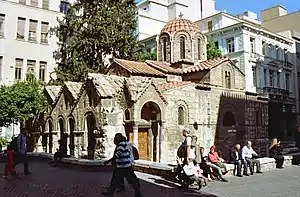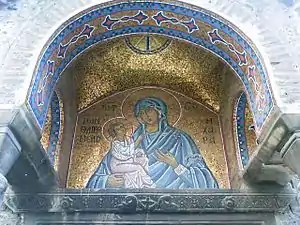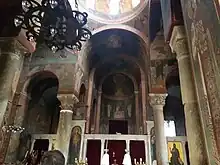Church of Panagia Kapnikarea
The Church of Panagia Kapnikarea (Greek: Εκκλησία της Παναγίας Καπνικαρέας) or just Kapnikarea (Greek: Καπνικαρέα) is a Greek Orthodox church and one of the oldest churches in Athens.


History

It is estimated that the church was built some time in the 11th century, perhaps around 1050. As it was common with the early Christian churches, this was built over an ancient Greek temple dedicated to the worship of a goddess, possibly Athena or Demeter. When King Otto I, King of the Kingdom of Greece, brought the Bavarian architect Leo von Klenze to draw the new city plan of Athens, the church was considered for demolition and it was the King of Bavaria, Ludwig I who objected the decision and saved the church.[1]
Architecture
It appears that the Kapnikarea church may have originally been the katholikon of a monastery. Presently, the building is formed by a complex of three different units attached together; these units were built in succession: a) the largest south church dedicated to the Presentation of Mary to the Temple, b) the chapel of St Barbara on the northern side; and c) the exonarthex with the propylon to the west.
The larger of the two churches, the south one, is a domed complex, cross-in-square, has been dated (on the basis of morphological criteria) to just after the middle of the 11th century.[2]
Location
The church is located in the center of the modern city of Athens, right in the middle of the high-traffic shopping area of Ermou street, at the edge of the Plaka district.
See also
References
Further reading
- "Church of Panagia Kapnikarea, description". Retrieved 2008-03-07.
- "KAPNIKAREA". Archived from the original on 2001-02-23. Retrieved 2007-04-06.

.jpg.webp)